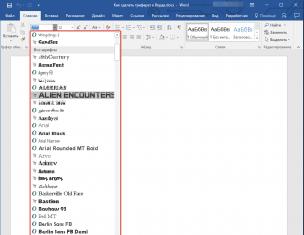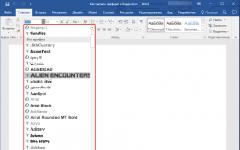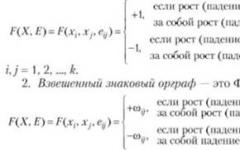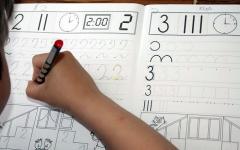1. A black cat sat on a mat
а nd rapidly ate a fat rat.
2. Bad lads are smacked by dad
Sam packed the hand bag
and run to catch the train.
3. The wise old owl sat in an oak
the more he heard the less he spoke.
4. Fat, Pat had a fat cat
Pat s fat cat sat at Pat s hat.
5. That s the man
Who sat on my hat in the tram.
6. Where are you going, my little cat?
I’ m going to town to buy a hat.
What? A hat for a cat?
A cat in a hat?
Who ever saw a cat in a hat?
7. A sailor went to sea
To see what he could see
Was sea, sea, sea.
8. As I was going to St. Ives,
I met a man with seven wives.
Every wive had seven sacks.
Every sack had seven kittens
Kittens, cats, sacks and wives.
How many were there going to St. Ives.
8. Monday for health,
Tuesday for wealth,
Wednesday is the best day for all,
Thursday for losses,
Friday for crosses,
Saturday no luck at all.
9. If many men knew
What many men went
If many men went
Where many men go,
If many men did
What many men do,
The world would be better
I think so, don’t you?
10. “Tick,” the clock says.
“Tick, tick, tick
What you have to do, do quick!
11. Rain on the grass
And rain on the tree
Rain on the house-top
But not on me.
12. Rain, rain, go away,
Come again another day.
Little Mary wants to play.
13. Rain, rain, go to Spain,
Never show your face again.
14. Good morning, good morning,
Good morning to you.
Good morning, good morning,
I’m glad to see you.
15. She sells sea-shells on the sea- shore.
The shells that she sells are sea-shells.
16. Once there lived a lad,
Who was always very sad
For he hadn’t any mother
And he hadn’t any dad.
17. One, two, three, four
Mary at the cottage door.
Five, six, seven, eight
Eating cherries off the plate.
18. Swim, son, swim!
Show me you’re a swimmer.
Swim just how the swans swim,
You know how the swans swim
19. Wealth is nothing without health
Health is above wealth.
20. How much wood would a wood-chuck
If a wood-chuck could chuck wood?
21. Six sharp sharks have come to swipe your limb.
22. So swim as swiftly as you can, swim, son, swim.
23. This fish has a thin fin.
That fish has a thick fin.
This fish is the fish.
That fish has a thinner fin than that fish.
24. Hello, hello, hello to you!
Hello, hello.
How are you?
25. The teacher thought and thought
And thought and no one knew the
Thought he thought.
26. Hickory, dickory, dock
The mouse ran up the clock.
The clock struck one,
The mouse ran down.
Hickory, dickory, dock.
27. Early to bed,
Early to rise
Makes a man
Healthy, wealthy and wise.
28. If you, Sandy, have two candies,
Give one candy to Andy, Sandy.
If you, Andy, have two candies,
Give one candy to Sandy, Andy.
29. Half heart is no heart.
30. He laughs best who laughs last.
31. Who’ll run fastest, you or I?
Who’ll laugh loudest? Let us try.
32. Polly put the kettle on,
Polly, put the kettle on,
Polly, put the kettle on,
We’ll all have tea.
33. Mother, father, sister, brother
Hand in hand with one another.
34. Good night, good night,
My little child!
Get up gay and bright
In the morning light!
35. Little cat, little cat
Where is your flat?
I’m a little cat,
I have no flat.
36. At night this side of the house
Seems quite light.
37. How do you do, Hatty?
How do you do?
I hope you are well, Hatty.
I hope you are too.
38. Swan swam over the sea.
Swim, swam, swim!
Swan swam back again.
Well swum, swan
39. This is my father,
This is my mother,
This is my brother Paul,
This is my sister,
This is my uncle,
How I love them all.
40. Good night, mother,
Good night, father.
Kiss your little son.
Good night, sister.
Good night, brother.
Good night, everyone.
41. These are three brothers,
These are their father and mother.
This is their other brother.
42. This is used for one thing here.
That means something over there.
Those and those mean two or more.
Those are far and these are near.
43. The third Thursday of
This month is the 16 th .
44. Healthful habits make healthy bodies.
45. This is a mouse.
She lives in the house.
This is a cat.
He is very fat
Because he lives in the house
And he likes to eat a mouse
46. When the weather is wet
WE mustn’t fret.
When the weather is cold
We mustn’t scold.
47. When the weather is warm
WE mustn’t storm.
But be thankful together
Whatever the weather.
48. Where’s the round roll
Robert Rowley rolled round.
49. Twinkle, twinkle, little star
How I wonder what you are.
Up above the world so high,
Like a diamond in the sky.
50. I have two legs
With which I walk
I have a tongue
With which I talk
And with it too
I eat my food
and tell
If it is bad or good.
51. William always wears a very warm
Woolen vest in winter, Victor however
Will never wear woolen underwear
Even in the wild west.
52. She sells sea she shells
On the sea shore. The shells
That she sells are sea shells,
I am sure.
53. Flowers here,
Flowers there,
Flowers growing
Everywhere.
54. I love learning English
I can read
I can write
I can speak English too.
I love learning English,
And what about you.
55. There was a little girl
And she had a little curl
Right in the middle of her forehead.
When she was good
She was very, very good,
But when she was bad,
She was horrid.
56. Diddle, diddle, dumpling, my son John,
Went to bed with his trousers on,
One shoe off, and one shoe on,
Diddle, diddle, dumpling, my son John.
Как написать стихотворение на английском языке? Сочинить несколько строк на английском языке совсем несложно. Как и в любом языке, а английском есть понятие рифмы, у одних слов рифм много, у некоторых - в лучшем случае одна.
Приведённый ниже список не включает в себя всех слов, оканчивающихся похоже на первое в каждой строчке, но является набором наиболее используемых рифм, использующихся в стихах и песнях, особенно популярных.
I - my, high, try, buy, guy, goodbye, bye, lie, sigh, tie, by, cry, why, Y, fly, fry, pie, defy, deny, sky, eye, die
You - do, to, too, two, blue, true, knew, Sue, zoo, shoe, knew, queue, Ooh
Love - (think) of, off, dove, glove, enough, tough, rough
Day - say, may, lay, stay, way, away, pay, play, gray, OK, USA, hay, tray, anyway, sleigh, clay
Me - see, sea, tree, be, bee, free, tea, she, we, fee, tee, key, b, V, P, D, C, CD, ABC,
Smile - while, crocodile, vile, mile
Baby - maybe
Worry - hurry
Face - place, lace, pace, race, case,
Money - honey, bunny, funny
Sun - one, fun, run, gone, done, gun, nun
Night - tight, light, might, sight, fight, bright, right, alright, white, knight, bite, kite,
Girl - world
Boy- joy, toy, destroy
Guys - lies, eyes, dies
News- blues, shoes, confuse
House - mouse, louse
Nice - twice, ice, rice, mice, lice,
All - tall, call, small, tall, fall, mall, roll, ball, crawl
Up - cup,
Dance-chance, romance, France
Name - same, game, lame, came, fame,
Miss - kiss, bliss, this,
Walk- talk
In - begin, sin, skin, bin, pin,
Rain - pain, train, main, Spain, in vain, lane, campaign, champagne,
Man - can, again, fan, ran, ban, pan, Dan, Stan
Tale - tail, fail, nail, snail, jail, mail, male, ale, sale, sail
Stop - top, cop, pop, hop,
Believe - live, leave
Black - back, sack, lack, pack, attack
Yellow - fellow, marshmallow,
Shield - yield
Feeling - ceiling
Green - seen, been, between, Queen
Bird - heard
Quick - kick , stick, sick , tick, thick, Rick, Nick, Dick
Pants - ants
Luck- duck, suck, muck
Much - touch
Lunch- munch, crunch, punch
Alone - flown, own,
Look - book, crook, took, shook,
Around - sound, ground, down , town, clown, frown, crown, brown,
Friend - end, spend,
Rent - sent, tent,
Clover- over
Bake- take, rake, sake, brake, cake, make, snake
Heart - apart, part, tart, start, smart,
Star - are, car, far, bar,
Cat - that, fat, bat, rat, sat, pat,
Sad - bad, glad, dad, pad, mad,
Bed - red, said, led, bread, head, dead
Crazy - lazy
Hurt- desert
Song - long, along, wrong, ping-pong, King-Kong
Sing - ring, string, ling
Door - four, floor, more, poor, tore, bore, sore,
Five - hive, jive, alive, drive
Wife - life, knife,
Child - wild, mild,
Kind - find, wind
I’m - time, lime, rhyme,
Nation - ration, civilization, information, congratulation(s), etc
Seven- heaven
Eight - ate, mate, fate, rate, late, gate,
Fine - nine, mine, shine, line, wine, vine, sign, combine,
Good - could, mood, should, would,
Blood- flood, mud, God
Ear - hear, near, sincere, dear, deer
There - hair, share, bear, pear, care, square
Corn - unicorn, horn, born, scorn
Well - shell, hell, fell, bell, tell, sell, spell, swell
Net - bet, pet, let, debt,
Некоторые рифмы с именами собственными и географическими названиями.
Trotsky - plotsky, lotsky, shotsky, hotsky (это не официальные слова английского языка, - ski добавлено для «русскости»)
Brutus - Judas
Ceasar - geezer
Romanoff - stroganoff
Rasputin - machine, queen
Linkoln - thinking
Polk - folk
Siberia - fear ya, carry ya
Leningrad - dad
Katmandu - you, do,
Gustav - moost have
Gropius - copious
Aльтернатива для рифмы.
Некоторые слова используются в основном в поэзии для рифмы с другими словами, но в жизни употребляются редко:
Upsot (“Jingle Bells”) - вместо Upset
Siree - sir
Оригинальные рифмы от Тома Лерера:
There, the guy who"s got religion"ll.
Tell you if your sin"s original.
And you may have thought it tragic
Not to mention other adjec-
Tives, to think of all the weeping they will do.
The tune don"t have to be clever,
And it don"t matter if you put a couple extra syllables into a line.
It sounds more ethnic if it ain"t good English,
And it don"t even gotta rhyme--excuse me--rhyne.
Надо отметить, что в песнях, где упоминается танец Бегин (beguin), рядом же стоит в той или иной форме и слово begin. А это песни "Begin the beguine", "Alma" , "Under ther Sea" и рифмовка из мультфильма "Yellow Submarine".
И помните - в стихотворении главное - душа!
Дополнения приветствуются.
Всем известно, что дети лучше и быстрее воспринимают информацию на английском языке через образы и игру. Поэтому, если вы изучаете английский вместе с ребятами, то сделайте его увлекательным для своих детей. В этом вам помогу разнообразные английские рифмовки, стихи, песенки. Как изучать английский с помощью стихов и считалок?
Такие стихи для детей на английском языке помогают лучше усвоить язык, произношение; они формируют словарный запас и английскую речь малыша.
Английские стихи и песенки для детей
Учить английские рифмованные строчки наизусть — для детей это увлекательно и интересно. Такие короткие стихотворения могут быть на разные темы — ребята могут узнать о школе, о друзьях, о временах года и т. д. на английском языке. Для детей всегда легко и весело что-то учить наизусть. Так как память ребенка еще свежая, то стихи и песни они запоминают легко, быстро и надолго.
Предлагаем вашему вниманию некоторые рифмовки для детей на английском языке на различные темы:
- Рифмовки о погоде и временах года:
Rain, rain, rain, April rain,
You are feeding seed and grain,
You are raining plants and crops
With your daily sparkling drops.
In winter I get up at night
And dress by yellow candle-light.
In summer quite the other way,
I have to go to bed by day.
- Песенки-рифмовки о еде:
Mix a pancake,
Stir a pancake,
Pop it in the pan.
Fry the pancake,
Toss the pancake,
Catch it if you can.
Peas Porridge Hot
Peas porridge hot,
Peas porridge cold,
Peas porridge in the pot,
Nine days old.
Some like it hot,
Some like it cold,
Some like it in the pot
Nine days old.
- Рифмованные считалочки:
One, two
One, two,
What must I do?
Three, four,
Close the door.
Five, six,
Pick-up sticks.
Seven, eight,
Clean the plate.
Nine, ten,
A big, fat hen.
One, one, one,
Pussy cat, run.
Two, two, two,
Dogs are after you.
Three, three, three,
Birds on a tree!
Four, four, four,
Chicks on the floor.
Five, five, five,
Yellow ducklings dive.
One, two,
Red and blue.
Up and down,
Yellow and brown.
This is a queen,
Orange and green.
That is a kite,
Black and white.
- Рифмовка о профессиях (с его помощью можно выучить как профессии, так и местоимения на английском). Его можно учить наизусть и одновременно инсценировать:
This Is How I Go
I am a driver,
This is how I go.
You are an actor,
This is how you go.
He is a barber,
This is how he goes.
She is a dentist,
This is how she goes.
We are farmers,
This is how we go.
They are teachers,
This is how they go.
 Грамматическая рифмовка на английском
Грамматическая рифмовка на английском
Зачем нужны рифмовки?
В работе с детьми по изучению иностранного языка можно применять любые методы и формы работы. Но мы выбираем те, которые будут наиболее интересными и увлекательными для детей.
Малышам интересно то, что мило, ярко, весело, красочно. Читайте эти стихи и песенки на английском языке вместе с вашим малышом, разучивайте их наизусть. Это тренирует память ребенка, делает изучение английского языка забавным и креативным. Сопровождайте рифмовки тематическими картинками, рисуйте вместе с вашим ребенком.
Слушайте такие стихи, считалки, песенки по аудио или видео материалам. Вы также можете сочинять на английском языке такие стихи вместе с ребятами. Если это песенки или считалочки, то сопровождайте их прихлопами, притопами, наклонами туловища; для малышни это будет вдвойне веселее и увлекательнее.
Как легко учить рифмовки с ребенком?
- Познакомьте ребенка со стихотворением/считалочкой/скороговоркой/песенкой. Прочитайте стишок несколько раз с выражением и интонацией. Затем попросите малыша повторить за вами каждую строчку. Теперь пусть он сам прочитает рифмовку
- Переведите стихотворение для малыша. Он должен понимать, о чем идет речь, иначе ему будет трудно, непонятно и скучно, а, следовательно, и неинтересно
- Покажите малышу картинки, иллюстрации к данному стихотворению. Спросите его, как он считает, почему изображены те или иные предметы/персонажи. Обсудите смысл стихотворения вместе
- Не забывайте о словарной работе, ведь мы учим язык с помощью таких рифмовок! Выпишите 3−4 слова из стихотворения, поработайте над ними вместе с малышом
- Читайте стишок несколько раз сами, хором с ребенком, ребенок самостоятельно
- Повторяйте каждую строчку несколько раз, просите повторить за вами вашего малыша. Затем вместе повторяйте стишок целиком, пока малыш не запомнит его наизусть.
Такую работу вы можете проделывать довольно часто. Если вы хотите каждый день учить какие-то рифмовки с вашим ребенком, то не перегружайте его, путь это будут 2−3 строчки. Если вы учите стихи два-три раза в неделю, то в этом случае они могут быть подлиннее.
Со временем, когда ребенок станет старше, он сможет учить наизусть стихи английских поэтов. А пока что, такие считалочки и песенки — хороший строительный материал для памяти и база для серьезных стихов в будущем.
Ну, вот и все, что мы хотели сказать об английских детских стихах. Учите их с вашим малышом и ваши занятия по английскому всегда будут ему в радость!
Игры на уроках английского языка
Черненко Е.Ю., учитель английского языка, МБОУ “СОШ№35” г.Осинники Кемеровской областиВ представленном материале можно познакомиться с разнообразными лексико-грамматическими играми и рифмовками, что делает любую учебную деятельность интересной, живой, мотивированной и непринуждённой. Материал предназначен для обучающихся младшей и средней школы.
Цель: демонстрация того, что можно привнести в учебный процесс для мотивации учащихся и развития их познавательного интереса к иностранному языку.
Задачи: - познакомить с игровыми приёмами, рифмовками, небольшими по объёму стишками по разным лексико-грамматическим темам.
Работа с английским алфавитом:
NAJBCEDYPOWIHVKU
1.Cоставьте из представленных букв слова.
2.Составьте имена девочек и мальчиков.
3.Назовите буквы в алфавитном порядке.
4.B/e F/r D/t E/e A/l G/s C/t – если вы расположите заглавные буквы в алфавитном порядке, то маленькие буквы составят слово. Прочитайте его.
5.Загадка о букве:
Little Katie is only three,
She must learn the ABC.
Now then, Katie, say to me,
What is the letter before “B” (“A”).
6.Вспомните слова со средней буквой “a” и заполните пропуски в словах:
…а…,…а…,…а…,…а…,…а…,…а…,…а…,…а…,…а…
Ответы(bag, map, man, can, has, cat, rat, sad, hat).
7.Назови гласные буквы английского алфавита (согласные буквы).
8. Споём песенку-алфавит.
9. Составьте из выделенных букв предложение - Doayoutuumlinkeahpmpleos? (Ответ - Do you like apples?)
10.Выполните задание согласно рифмовке:
I now all letters well,
I can read them and spell.
Числительные:
Рифмовки, в тексте которых есть числительные, позволяют быстро научиться считать, понимать и самим использовать их в речи.
1.One little apple on the tree,
Two apples for you and me,
Three apples by the door,
And four apples on the floor,
The apples are good and sweet,
Can you count them all, Pete?
2.One apple, two apples,
Three apples, four,
Five apples, six apples,
Seven apples more.
Now tell me, little Paul,
Can you count them all?
3.How much is one plus one?
… apples growing in the sun.
How much is two plus two?
… apples for little Sue.
How much is three plus three?
… apples on the apple-tree.
How much is four plus four?
… red apples, and no more.
4.Six little apples are on the tree,
Andy goes up the tree,
down come three.
5.How much is eight and eleven?
Asks little Evan.
How much is eleven and eight?
Asks little Kate.
How much is eight from eleven?
Wants to know little Evan.
How much is eleven minus eight?
Wants to know little Kate.
6.How many flowers do you see?
How many flowers do you see?
Eight in Bobbys hands,
Eight in Nellys hands,
How many flowers do you see?
7.Nine and one –
Fun in the bright sun.
Nine and two –
Fun for Nick and you.
Nine and three –
Fun by the green tree.
8.I see nine apples on the tree,
Six of them fall,
And now they are three.
9.There are nine cakes,
On a little plate,
I eat one of them,
And now there are eight.
10.Five little dogs
Playing by the door,
One runs away,
And now there are four.
11.Our class has two Bellas,
Two Jims and two Stellas,
Three Anns and three Dicks,
Five Kates and three Nicks,
Eight Sams and four Bills,
Five Nells and two Jills,
But we have only one Paul,
Can you count them all?
Рифмовки на введение и закрепление грамматических правил:
1.Past Simple
What did you do last night?
Did you eat a piece of cake?
Did you drink a lemonade?
Did you go to school at nine?
Did you drink a glass of wine?
Did you kiss a pretty maid?
Did you see a bank raid?
Did you watch a TV show?
Did you hear the winds blow?
Did you help your mother?
Did you hit your brother?
Did you stay in bed, boy?
Oh, I think you are mad, boy.
That’s what you did last night.
2.Present Continuous
When I heard that knock, nock, nock.
I was looking at the clock.
Mum was watering the flower.
Daddy was just taking a shower.
When I heard that Ding, Ding, Dong,
I was singing a favourite song,
Sister Pam was feeding a cat,
Brother Tommy was hunting the rat.
3.Present Perfect
Come on now everyone,
Do what you ’ve never done,
Sing if you’ve never sung,
Swing if you’ve never swung,
Drive if you’ve never driven,
Give if you’ve never given,
Ride if you’ve never ridden,
Hide if you’ve never hidden,
Catch if you’ve never caught,
Buy if you’ve never bought,
Cry if you’ve never cried,
Try if you’ve never tried.
4.Present Simple
Every day I get up early in the morning,
Every day I wash my face early in the morning,
Every day I brush my teeth, comb my hair put on my jeans,
Every day I say goodbye early in the morning,
Every day I meet the boys and forget about my toys,
Every day I go to school early in the morning,
Every day I meet my friends early in the morning,
Every day I talk to them early in the morning,
Every day we sing as well, listen to the teacher and wait for the bell,
Every day I meet my friends early in the morning.
5.Conjunctions
as……as
As good as gold,
As sweet as wine,
As big as the ocean,
As deep as a mine,
As free as the wind,
As dark as the night,
That’s I feel
when you hold me tight.
As hot as sunshine,
As wet as rain,
As soft as velvet,
As fast as train,
As cold as ice,
As bright as light,
Take all my feelings
When I hold you tight.
6.Degrees of Adjectives
A rope is thicker than a thread,
A hat is bigger than a head,
A plane is faster than a fly,
And you can do it if you try.
A bus is slower than a train,
A road is wider than a lane,
But what flies higher than a kite?
If it has wings, you could be right.
So now you know, we all know.
A bike is cheaper than a car,
But what shines brighter than a star?
Does anything travel faster than light?
Maybe you are wrong, maybe you are right,
So now you know, we all know.
Валентина Киряева
Рифмовки и догадки с лексикой на английском языке по темам «Цвета», «Части тела» и «Трапезы и еда».
Рифмовки и догадки «Цвета»
У меня сомнений нет
Красный цвет конечно – red.
Вот неспелый мандарин.
Он пока зеленый – green.
Нарисую кораблю
Море синей краской – blue.
А потом раскрашу смело
Солнце желтой краской – yellow.
Кот ни в чем не виноват.
Он всегда был белый – white.
Но залез в трубу на крыше,
Черный – black оттуда вышел.
Рифмовки и догадки «Части тела»
В футболе за мячом бегут
По-английски ступня – foot.
При любой погоде
Закаляю тело – body.
Много боли, много бед
И страдает моя head.
От проблем и школьных бед
Разболелась моя head.
Кто не моет шею – neck,
Тот пропащий человек.
Чтоб крутил головой человек
Есть на теле для этого neck.
Обожаю быстрый бег
По-английски нога – leg.
Я силач! 5 килограмм
Поднимаю каждой arm.
Спросят: «Сколько тебе лет?»
Покажу я руку – hand.
Палец я сломал на ринге,
Палец по-английски finger.
Рифмовки и догадки «Трапезы и еда»
Ах, как приятен он на вкус!
Сок по-английски будет juice.
Кисло сладкий он на вкус.
Витаминный пейте juice.
Вам чашку чая принести?
Чай по-английски будет tea.
Гости к нам должны прийти!
Нужно приготовить tea.
Масло нужно всем ребятам.
Масло по-английски – butter.
Французская дама Софи
По утрам пьет крепкий coffee.
Прежде чем пойти в свой колледж,
Съешь тарелку каши porridge.
Это вовсе не каприз
Сыр мы называем cheese.
Нужен всем нам на обед
Пышный, вкусный, свежий bread.
Печенье – cookies - я люблю
С собой немножечко возьму.
Публикации по теме:
Словесные игры на английском языке для дошкольников "Словесные игры на английском языке для дошкольников" Игра-огромный стимул в изучении английского языка. Дети с удовольствием играют, при.
Части тела. Игра-занятие. Первая младшая группа Человек. Части Тела. Что бы нам большими стать О себе нам надо знать – Сколько есть у нас чего? Рук, и глаз, и пальцев ног. Что мы можем.
Конспект проведения прогулки на английском языке в старшей группе Конспект проведения прогулки на английском языке в старшей группе. Программное содержание: Образовательная задача: активизировать словарь.
Составитель: воспитатель МАДОУ №51 г. Сыктывкара «Золотая рыбка» Торлопова Татьяна Андреевна. Возрастная группа: подготовительная. Цель:.
Конспект НОД «Части тела» для детей подготовительной к школе группы Программные задачи: 1. Создать условия для осознания детьми значимости и необходимости каждого органа чувств в отдельности и всех вместе.
Сценарий (мюзикл на английском языке) «Кошкин дом» («Cat, s House») Сценарий мюзикла на английском языке «Cat,s house» (Кошкин дом) Герои: 1) A cat - Кошка 2) A black cat – Черный кот 3) A kitten №1 – Котенок.
Сценарий праздника на английском языке «До свидания, детский сад!» Сценарий праздника До свиданья, детский сад! Штайнепрайс Мария Владимировна. МАРИЯ ШТАЙНЕПРАЙС Представляю вашему вниманию сценарий праздника.
Дети сидят на стульях в зале. Под веселую музыку вбегает Веснушка-Хохотушка. Хохотушка: Я веселая Веснушка, я Веснушка-Хохотушка. Здравствуйте,.









